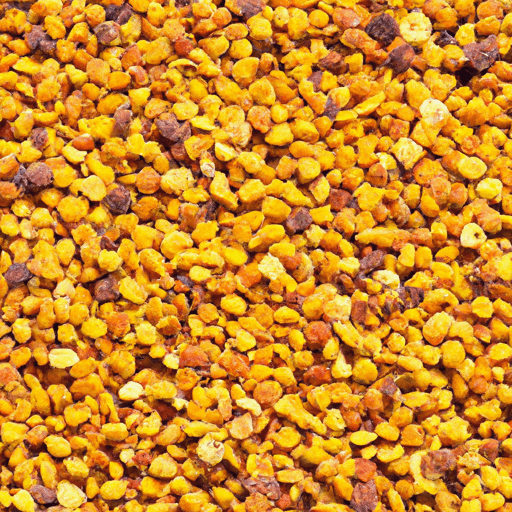The Buzz about Bee Pollen: A Culinary Delight
If you’re a food enthusiast looking to explore unique ingredients, then bee pollen should be on your radar. This vibrant and nutrient-packed superfood has been a staple in traditional medicine and cooking for centuries. In this blog post, we’ll delve into the fascinating world of bee pollen, exploring its taste, culinary uses, nutritional benefits, and intriguing history.
A Taste of Nature’s Bounty
Bee pollen has a distinctive taste that can be described as mildly sweet with floral undertones. Its flavor profile can vary depending on the flowers from which the pollen is collected. Some may find it slightly earthy, reminiscent of the blooming meadows where bees diligently collect the tiny golden granules. This natural variation in taste adds a captivating twist to a wide range of culinary creations.
Culinary Masterpiece: Adding Bee Pollen to your Recipes
1. Smoothies and Bowls
Bee pollen can take your morning smoothie or breakfast bowl to the next level. Sprinkle a spoonful of bee pollen on top, and you’ll not only enhance the visual appeal but also infuse your dish with a burst of flavor and texture. Its delicate crunch and natural sweetness complement fruits, yogurt, granola, and a variety of other ingredients.
2. Salads and Dressings
Kick your salads up a notch by incorporating bee pollen. Its subtle sweetness and unique taste can transform an ordinary salad into a gourmet creation. Sprinkle it over fresh greens, cucumber slices, or even mixed in your homemade salad dressings for a delightful touch.
3. Baking Adventures
Bee pollen can step into the spotlight when it comes to baking. It can be incorporated into bread, muffins, cookies, and cakes, adding a captivating twist to your favorite recipes. From a simple honey and bee pollen cake to savory baked goods infused with this golden gem, the possibilities are endless.
4. Food Garnish
The vibrant colors of bee pollen make it an eye-catching garnish. Its granular texture and golden hue can add a final touch of elegance to your dishes. Use it to sprinkle over desserts, avocado toast, smoothie bowls, or even savory dishes like roasted vegetables or grilled meats.
Nutritional Powerhouse
Beyond its culinary merits, bee pollen is prized for its exceptional nutritional value. Packed with vitamins, minerals, and proteins, it is often hailed as a superfood. Notably, bee pollen is a valuable source of B vitamins, antioxidants, amino acids, and enzymes. It is believed to support immune health, provide an energy boost, and aid in digestion. However, like with any new food or supplement, it’s important to check with a healthcare professional if you have any existing allergies or health conditions.
The Buzzing History of Bee Pollen
Bee pollen’s use can be traced back to ancient civilizations, including the Egyptians and the Chinese, who recognized its medicinal properties and incorporated it into their traditional practices. Legends have suggested that Hippocrates, the Father of Medicine, praised bee pollen for its numerous benefits. Additionally, many cultures around the world, including Native Americans, have long regarded it as a sacred and nourishing food.
A Final Note of Caution
While bee pollen is a natural ingredient, it may cause allergic reactions in some individuals, especially those with pollen allergies. If you’re considering incorporating bee pollen into your diet, it’s recommended to start with a small amount and observe any potential adverse effects. As with all dietary changes or supplements, it’s best to consult with your healthcare professional to ensure it’s suitable for you.
So, venture into the culinary realm of bee pollen and elevate your dishes with its enticing taste, nutritional benefits, and rich history. Whether you’re sprinkling it over your morning smoothie or experimenting with new baking recipes, bee pollen is sure to add a touch of luxury and uniqueness to your culinary creations.
Interesting Facts About Bee Pollen:
Origin: Bee pollen is a natural substance that is collected by bees from the stamen of flowering plants. Bees transport the pollen back to their hives and use it as a primary source of protein and other nutrients.
Common Uses: Bee pollen is commonly used as a dietary supplement and is also found in some natural skincare products. It can be consumed on its own or added to smoothies, yogurt, cereal, or baked goods.
Nutritional Benefits: Bee pollen is highly nutritious and is often referred to as a “superfood.” It is rich in proteins, amino acids, vitamins (including B vitamins), minerals (such as iron, zinc, and magnesium), enzymes, and antioxidants. However, the nutritional composition can vary depending on the plant sources bees collect pollen from.
Unique Properties: Bee pollen is known for its unique composition, which includes a multitude of different plant nutrients. It is considered a complete protein, meaning it contains all essential amino acids required by the human body. Bee pollen is also notable for its high antioxidant content, which helps protect cells against oxidative stress.
Historical Significance: Bee pollen has been used in traditional medicine for centuries. Ancient cultures such as the Egyptians, Romans, and Chinese recognized its potential health benefits. Even today, some alternative medicine practices continue to explore the potential therapeutic properties of bee pollen, although further scientific research is needed to fully understand its effects.
Please note that while bee pollen is generally safe for most people, individuals with pollen or bee-related allergies should exercise caution when consuming or using bee pollen products.




Use the share button below if you liked it.
It makes me smile, when I see it.